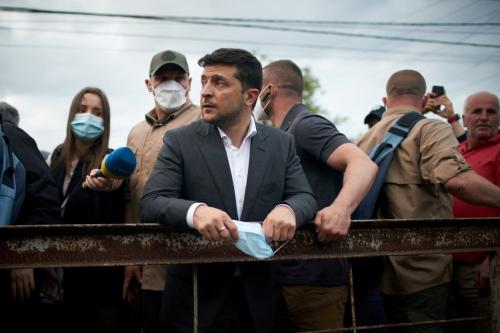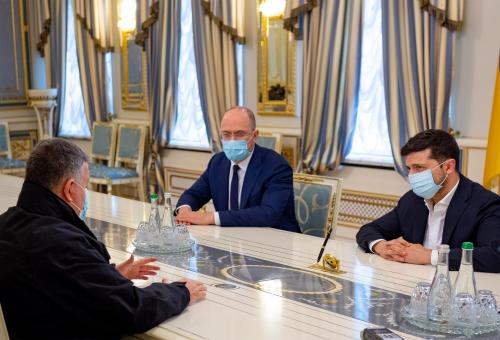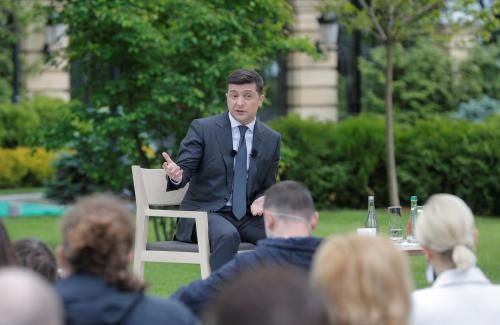The outcome of a 2020 presidential election will mean very different things for U.S. policy toward Ukraine: either a Biden administration that understands the U.S. interest in a successful Ukraine or a Trump administration that might seek to better U.S. relations with Russia or withdraw from NATO, argues Steve Pifer. This post originally appeared as a contribution to the New Europe Center’s, a Ukrainian think tank, collection of analyses on the implications of the 2020 U.S. presidential election for Ukraine.
For Americans, the November 3 presidential election will be the most significant vote in many decades. The election also will have consequences for Ukraine: Whether Donald Trump or Joe Biden sits in the White House at the end of the day on January 20, 2021 will matter greatly for U.S. policy toward Ukraine and Europe.
Since Ukraine regained its independence in 1991, the United States has proven a strong and supportive partner. Presidents Clinton, Bush and Obama each saw a stable, independent, democratic Ukrainian state with a robust market economy as in the U.S. interest, including in contributing to a more stable and secure Europe. Washington thus has provided substantial political, economic and—particularly since 2014—military support to Kyiv. It has sanctioned Russia for its aggression in Crimea and Donbas and sought to bolster NATO in the face of a growing Kremlin challenge to Western security.
The Trump administration has largely continued these policies. It has provided Kyiv reform and military aid, including lethal military assistance. It has applied additional sanctions on Russia, albeit under pressure from Congress. And it has taken steps to strengthen the U.S. military presence in NATO, at least until recently.
However, it has never been clear that Mr. Trump himself supports these policies. His principal engagement on Ukraine was his attempted extortion of Kyiv to advance his personal political prospects, an effort that led to his impeachment. While his administration has taken a tough line on Russia, Mr. Trump seems incapable of criticizing Vladimir Putin or Russian misdeeds. He apparently thinks that Ukraine, not Russia, interfered in the 2016 U.S. presidential election, ignoring the conclusions of the U.S. intelligence community, the Mueller investigation and the Republican-led Senate Intelligence Committee.
Mr. Trump’s disdain for NATO has long been clear, going back to the 1980s. In June, he decided to withdraw 10,000 U.S. troops from Germany, apparently out of pique at Chancellor Merkel’s refusal to attend a G7 summit at Camp David. Senior Pentagon officials scrambled for weeks to offer military justifications for the drawdown, but those that they provided did not survive serious scrutiny.
If Mr. Trump is re-elected, he will not have to worry about facing the voters in another election campaign. He will cement his control of the Republican Party, leaving Republicans in the Senate and House of Representatives less able to block his bad instincts. What accommodations would he make with Mr. Putin? Would he be inclined, as he suggested in 2016, to recognize Russia’s illegal annexation of Crimea and lift economic sanctions? Would he withdraw the United States from NATO, as many former U.S. officials fear? The Alliance’s collapse would be a huge gift to Mr. Putin and leave Ukraine in a precarious geopolitical position.
It will be different if Mr. Biden is elected. The United States would have a president who understands the U.S. interest in a successful Ukraine and who knows the country well from his time as vice president. He would be the kind of friend that Ukraine needs, supportive but also ready to press the Ukrainian leadership to take necessary reform steps. He recognizes the security challenge that Russia presents to Ukraine and the West, and he realizes the importance of a strong trans-Atlantic relationship with a robust NATO at its core. And Mr. Biden might prove a president who could bind some of the differences that so badly divide Americans today. An America more unified at home would be a stronger international actor.
Whether Mr. Trump or Mr. Biden wins the elections will mean very different things for U.S. policies affecting Ukraine. That said, the American electorate will decide the next president largely on domestic issues, such as the Trump administration’s handling of COVID19 and the economy. Ukraine has no role to play in this, and Ukrainian officials should continue to do all that they can to avoid their country becoming a political football in the U.S. campaign.
The Brookings Institution is committed to quality, independence, and impact.
We are supported by a diverse array of funders. In line with our values and policies, each Brookings publication represents the sole views of its author(s).









Commentary
A consequential election for Ukraine
October 28, 2020